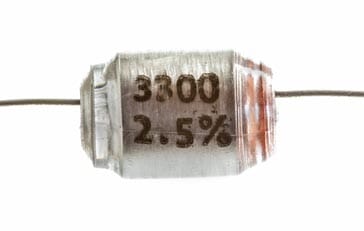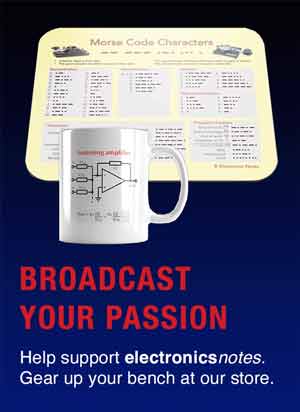Polystyrene Capacitor
Polystyrene capacitors are used in a number of applications where leaded high tolerance capacitors are required.
Home » Electronic components » this page
Capacitor Tutorial Includes:
Capacitor uses
Capacitor types
Electrolytic capacitor
Ceramic capacitor
Ceramic vs electrolytic
Tantalum capacitor
Film capacitors
Silver mica capacitor
Super capacitor
Supercapacitor vs batteries
Surface mount capacitors
Specifications & parameters
How to buy capacitors - hints & tips
Capacitor codes & markings
Conversion table
A Concise Guide to The Basics of Capacitance
Polystyrene capacitors are used within a limited number of applications. Polystyrene capacitor construction does not lend itself to surface mount technology and accordingly polystyrene capacitors tend to be used for leaded applications.
As a result of their construction and limited use, polystyrene capacitors are not widely used these days and can sometimes be difficult to source.
Polystyrene capacitor properties
Polystyrene capacitors are not widely available these days, however they still find applications within audio circles. This is as a result of their electrical characteristics which lend them to these applications.
The polystyrene capacitors provide a number of electrical characteristics which make them suitable for a number of applications. These capacitors provide high insulation, low leakage, low dielectric absorption, low distortion and excellent temperature stability.
In view of their properties, polystyrene capacitors can often be used in place of silver mica or ceramic disc capacitors.

Polystyrene dielectric properties
The dielectric used within polystyrene capacitors has a number of properties which enable them to have excellent properties for many applications.
| Polystyrene Dielectric Properties | |
|---|---|
| Property | Details |
| Dielectric constant | 2.5 - 2.6 |
| Dielectric strength | 19.7 MV/m |
| Loss tangent | 0.0001 @ 100 MHz 0.00033 @ 3 GHz |
Polystyrene capacitor advantages and disadvantages
While the polystyrene capacitor has many advantages it also has a number of disadvantages as well.
Polystyrene capacitor advantages
- High insulation
- Low leakage
- Low dielectric absorption
- Low distortion (audio enthusiasts like them because of this)
- Good temperature stability
Polystyrene capacitor disadvantages
- Technology does not lend itself to SMT
- Not heat resistance - polystyrene melts
- Very limited availability
Polystyrene capacitors are used in a limited number of applications, and only as leaded components. Nevertheless they can be usefully used to provide good performance in many applications.
 Written by Ian Poole .
Written by Ian Poole .
Experienced electronics engineer and author.
More Electronic Components:
Batteries
Capacitors
Connectors
ADC
DAC
Diodes
FET
Inductors
Memory types
Phototransistor
Quartz crystals
Relays
Resistors
RF connectors
Switches
Surface mount technology
Thyristor
Transformers
Transistor
Unijunction
Valves / Tubes
Return to Components menu . . .



